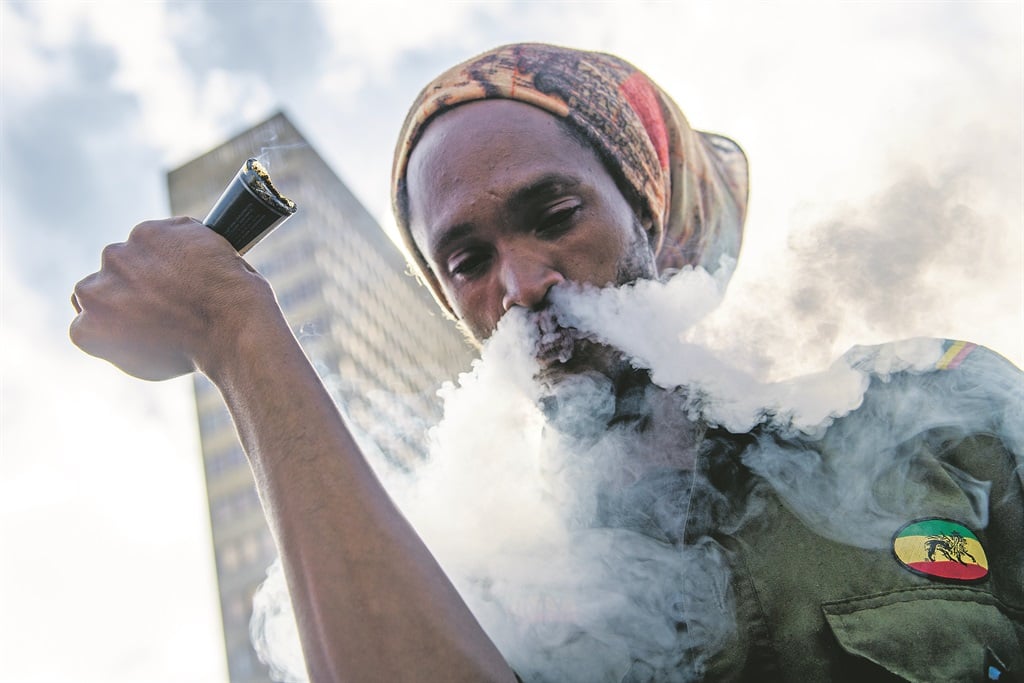
Honderde mense het in 2015 aan ’n optog vir die wettiging van dagga in Kaapstad deelgeneem. Foto: Jaco Marais
Multimedia · User Galleries · News in Pictures Send us your pictures · Send us your stories

Honderde mense het in 2015 aan ’n optog vir die wettiging van dagga in Kaapstad deelgeneem. Foto: Jaco Marais
Multimedia · User Galleries · News in Pictures Send us your pictures · Send us your stories

The Constitutional Court's decision that citizens are permitted to use dagga in private turned the clock back 96 years.
Before it was declared a prohibited substance in 1922, dagga was a part of the culture of South Africa's peoples – including white Afrikaners.
Interestingly, the campaigns against and warnings about the dangers of dagga usage are not a prudish phenomenon of the 21st century. It is as old as dagga smoking itself.
Dagga, or cannabis sativa, is indigenous to central Asia. As long ago as 2 700 BC it was used as a recreational drug and painkiller in China and India.
The Greek historian Herodotus wrote in 450 BC that the plant was used in the manufacture of clothes, but also for pleasure. Dagga was very popular in the Middle East for a period, because Muslims were prohibited from consuming alcohol but not dagga. It was only later also declared haram.
Dagga has been used in Ethiopia since the 13th century, but most researchers believe it arrived in southern Africa around the eighth century and was brought here by Arab or Indian traders who visited east coast cities for many centuries.
A Dominican priest, Joao dos Santos, recorded in 1609 that he had witnessed the Khoikhoi at the Cape getting intoxicated after using dagga. The word actually comes from the Khoi word daXab.
The Hancumqua clan of the Khoikhoi who lived in the region of present-day Graaff-Reinet were famous dagga cultivators and were called the Dagga Makers by the early Dutch settlers. The Hancumqua had close contacts with the Nguni-speakers of the East Coast who had been cultivating dagga for centuries.
Travellers recorded that the Khoikhoi not only smoked dagga in pipes, but also consumed it as tea or in small loaves of bread.
Dagga was thus an integral part of the culture of the people of the subcontinent before the first Europeans came to settle here. Dagga may also have played a part in the spiritual rituals of some groups.
But even then there were those wise ones who noticed the negative effects of regular usage of dagga on people's health and behaviour. The Sotho-speaking chief and philosopher Mohlomi campaigned against the consumption of alcohol and dagga during the late 1700s. He warned that regular use of dagga made people stupid and unproductive. His protégé, king Moshoeshoe, later also warned his people against smoking too much dagga. The first president of the ANC and founder of the first Zulu-language newspaper, John Dube, was also an anti-dagga campaigner.
Some of the earliest European settlers clearly enjoyed the odd joint. The trader George Thompson recorded in 1823 that he had seen a large crop of dagga leaves drying in a Graaff-Reinet farmer's barn. Bags of dagga were advertised in the Cape Times as late as in 1889.
Some of those early farmers smoked a dagga pipe in the late afternoon as a sundowner. It is known that the Voortrekkers took dagga with them on the Great Trek to use as medicine but also as a way to relax.
In 1965 the Akademie vir Wetenskap en Kuns published a book on traditional Afrikaner cures and recorded 89 of them with dagga as an ingredient.
Dagga was officially declared a forbidden substance by an act of parliament of the Union of South Africa in 1922.
It was high time the private use of dagga was decriminalised, and also in line with the international trend.
Instead of enticing more people to use the drug, the decriminalisation could actually neutralise the attraction of dagga among teenagers. The fact that regular use of dagga by teenagers presents serious health and psychological risks is no longer contested by scientists.
Parliament now has to adjust existing legislation banning the use of dagga and clarifying exactly when it is permissable.
As I have stated in this column before, government should wake up to the massive economic potential of traditional communities such as those along the east coast cultivating cannabis for medicinal purposes and the variant with the drug THC, hemp, for industrial use.
Disclaimer: News24 encourages freedom of speech and the expression of diverse views. The views of columnists published on News24 are therefore their own and do not necessarily represent the views of News24.